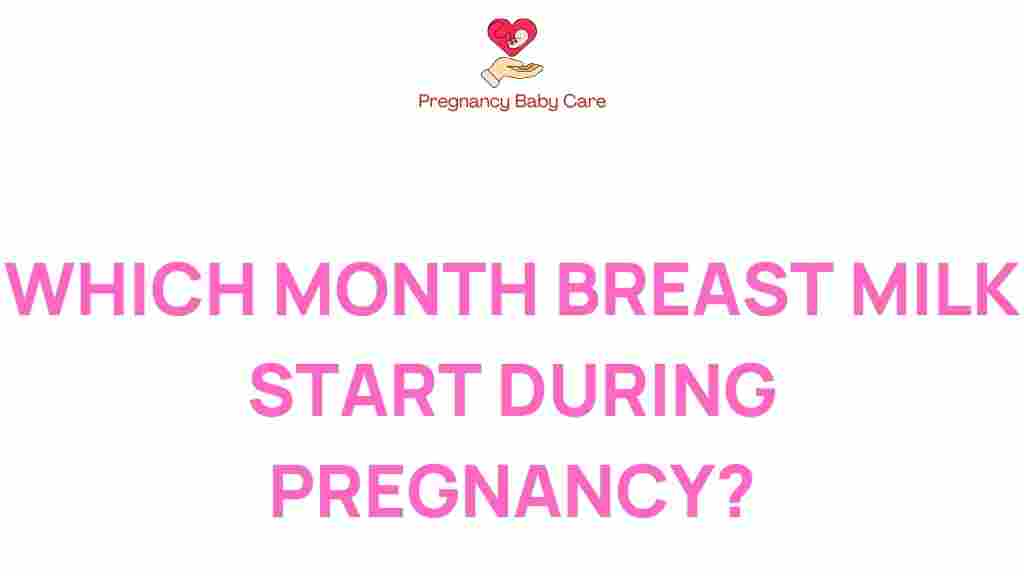Unveiling the Mystery: When Does Breast Milk Production Begin During Pregnancy?
For expectant mothers, the journey into motherhood is filled with excitement and curiosity. One significant aspect of this journey is understanding breast milk production. Knowing when milk production begins during pregnancy can help mothers prepare for breastfeeding and ensure optimal maternal health and newborn care. In this article, we will explore the stages of lactation, the factors influencing breast milk production, and how prenatal nutrition plays a crucial role in this process.
The Science Behind Breast Milk Production
Breast milk production is a complex biological process that begins well before the baby is born. The body prepares itself for breastfeeding during pregnancy through various hormonal changes.
- Hormonal Changes: Key hormones like estrogen, progesterone, and prolactin are responsible for initiating milk production.
- Development of Mammary Glands: During pregnancy, the mammary glands undergo significant development, preparing for lactation.
When Does Milk Production Begin?
Many expectant mothers wonder, “When will I start producing breast milk?” The answer varies, but here’s a general timeline:
- First Trimester: During the first 12 weeks of pregnancy, the body begins to prepare for lactation. However, actual milk production is minimal.
- Second Trimester: Around 16-20 weeks, colostrum, a thick yellowish fluid, begins forming. This is the first form of breast milk that provides essential nutrients and antibodies to the newborn.
- Third Trimester: By 28-36 weeks, some women may notice leaking of colostrum. This is a sign that their bodies are preparing for breastfeeding.
Factors Influencing Milk Production
Several factors can influence the onset and extent of milk production during pregnancy:
- Genetics: Family history can play a role in how early and how much breast milk is produced.
- Health Conditions: Conditions such as diabetes or hormonal imbalances may affect lactation.
- Nutrition: Proper prenatal nutrition is essential for healthy milk production. A balanced diet rich in vitamins and minerals supports both maternal health and newborn care.
Steps to Prepare for Breastfeeding
Being informed and prepared can enhance the breastfeeding experience. Here are some steps expectant mothers can take:
- Educate Yourself: Attend prenatal classes focusing on breastfeeding and lactation to understand the process better.
- Consult Healthcare Providers: Discuss any concerns about milk production or breastfeeding with your doctor or lactation consultant.
- Plan for Nutrition: Incorporate a nutrient-rich diet that includes fruits, vegetables, whole grains, and healthy fats. Foods like oats, almonds, and leafy greens can support milk production.
Common Questions About Milk Production
Many expectant mothers have questions regarding breast milk production. Here are some frequently asked questions:
- Is it normal to leak colostrum? Yes, leaking colostrum in the third trimester is common and indicates that your body is preparing for breastfeeding.
- What if I don’t produce colostrum? Some women may not notice colostrum leakage, but this doesn’t necessarily mean they will have trouble breastfeeding.
Troubleshooting Tips for Expectant Mothers
While preparing for breastfeeding, you may encounter some challenges. Here are some troubleshooting tips:
- Stay Hydrated: Drink plenty of water to support your body’s fluid needs, which is essential for milk production.
- Support Your Breasts: Use a supportive bra to help with any discomfort as your body changes.
- Talk to Professionals: If you have concerns about maternal health or breastfeeding, consult a lactation consultant or your healthcare provider.
The Role of Prenatal Nutrition in Milk Production
Nutrition is a crucial component of a healthy pregnancy and successful breastfeeding. Here are some dietary recommendations:
- Protein: Essential for the growth of breast tissue and milk production. Include sources like lean meats, dairy, and legumes.
- Calcium: Important for bone health, which is crucial during pregnancy and lactation. Incorporate dairy products, leafy greens, and fortified alternatives.
- Iron: Vital for preventing anemia during pregnancy. Sources include red meat, beans, and fortified cereals.
For more information on prenatal nutrition, visit this comprehensive guide on maternal health and nutrition.
Conclusion
Understanding when breast milk production begins during pregnancy is essential for expectant mothers as they prepare for breastfeeding and newborn care. By being informed about the milk production timeline, taking care of maternal health, and focusing on proper prenatal nutrition, mothers can ensure a smoother transition into lactation. Remember, every mother’s journey is unique, and seeking support from healthcare professionals can make a significant difference. Embrace this beautiful journey into motherhood with confidence and knowledge!
This article is in the category Pregnancy and created by PregnancyBabyCare Team
